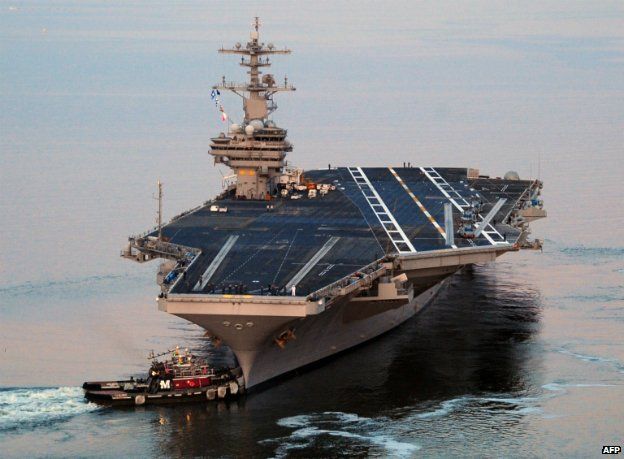Iraq conflict: US sends warship to the Gulf
- Published

The US says it is sending a major warship into the Gulf to provide it with military options should the situation in Iraq deteriorate further.
US Defence Secretary Chuck Hagel ordered the USS George HW Bush, which carries dozens of fighter jets, to be moved from the North Arabian Sea.
Meanwhile, Iran says it could be prepared to work with the US to fight Sunni insurgents in Iraq.
The insurgents have seized several cities and are threatening Baghdad.
Fighting under the banner of The Islamic State in Iraq and the Levant (ISIS), they regard Iraq's Shia majority as "infidels".
Former General Muzhir al Qaisi: "The difference between us and ISIS...we fight with rules, with Geneva convention....[they] are barbarians"
But the BBC's Jim Muir, reporting from Iraq, says Iraqi security forces - bolstered by an increasing number of Shia and Kurdish militiamen - appear to be holding the advance by Sunni militants north of Baghdad and have retaken a number of towns that had fallen to the rebels.
In one, Ishaq, security forces said they had found the incinerated bodies of 12 policemen.
Our correspondent says government forces are building up in the city of Samarra, apparently preparing for a counter-offensive designed to drive rebels out of Saddam Hussein's hometown, Tikrit, to the north.
State forces and Shia militia are also reported to have ousted rebels from two towns in Diyala province north-east of Baghdad. But an air strike on the town of Jalawla killed seven Kurdish fighters by mistake; they had earlier moved in to positions evacuated by the Sunni rebels.
US President Barack Obama has said he will take several days to decide what action to take over Iraq, but insisted that no US troops will be deployed.
The aircraft carrier USS George HW Bush will be accompanied by the guided-missile cruiser USS Philippine Sea and the guided-missile destroyer USS Truxtun. They were due to arrive in the Gulf late on Saturday.
US Secretary of State John Kerry has called on Iraq's political leaders to put their differences aside to defeat the Islamist offensive.
Mr Kerry urged the government to ratify recent election results without delay and stick to a constitutional time-frame to form a new government.
Analysis: Richard Galpin, BBC News, Baghdad
A long line of pick-up trucks and cars sped through the streets of central Baghdad on Saturday filled with heavily armed men; a cacophony of blaring horns, sirens and pumping music heralding their arrival.
It was evidence that the call to arms made on Friday by the most senior Shia religious leader Grand Ayatollah Ali al-Sistani was being heeded in the capital as in other cities, particularly in the Shia-dominated south.
The convoy was manned by members of a Shia militia called the Mahdi Army, which has sprung back to life in recent days after lying low following its notorious role in the sectarian conflict with the minority Sunni community, which came to an end about six years ago.
One cleric, sitting with a driver and bodyguard in an expensive four-by-four vehicle, said they were prepared to fight to the death and "splash their blood" to rid Iraq of the ISIS "terrorists".
Other members of the militia said they would help defend Baghdad and head further north to bolster the regular army on the frontlines in Diyala and Salahaddin provinces.
Correspondents say the US is frustrated with Iraqi Prime Minister Nouri al-Maliki and his Shia-led government for ignoring the concerns of Sunnis and Kurds.
Earlier, Mr Maliki addressed troops in the city of Samarra, north of Baghdad, insisting: "This is the beginning of the end of them [ISIS]."
Iran presence
Fears of ISIS sparking a wider Sunni uprising have increased with reports that other groups have joined the insurgents.
Our correspondent spoke to former General Muzhir al-Qaisi, a spokesman for the General Military Council of the Iraqi Revolutionaries, a Sunni group that entered Mosul alongside ISIS fighters.
General al-Qaisi described ISIS as enemies of his militia, but said they did not want clashes with them to slow their march towards Baghdad to oust the government.
President Rouhani: "If the government of Iraq requests any help we are of course ready to consider it"
Meanwhile, Iranian President Hassan Rouhani said he had offered direct assistance to Baghdad but denied that he had sent troops to fight in Iraq.
However, the BBC's Kasra Naji in Iraq has been told that more than 130 of Iran's Revolutionary Guards have arrived to provide training and advice. An Iranian general is also reported to be in the capital.
General Qassem Suleimani, the top commander of Iran's Quds Force, is said to be organising Iraqi Shia militia groups that are loyal to Iran.
Large crowds of volunteers prepared to fight insurgents gathered in Baghdad, as Janey Mitchell reports
ISIS in Iraq
- The Islamic State in Iraq and the Levant (ISIS) has 3,000 to 5,000 fighters, and grew out of an al-Qaeda-linked organisation in Iraq
- Joined in its offensives by other Sunni militant groups, including Saddam-era officers and soldiers, and disaffected Sunni tribal fighters
- ISIS has exploited the standoff between the Iraqi government and the minority Sunni Arab community, which complains that Shia Prime Minister Nouri Maliki is monopolising power
- The organisation is led by Abu Bakr al-Baghdadi, an obscure figure regarded as a battlefield commander and tactician
Are you in Baghdad or any of the other affected cities? Have you been affected by the latest developments? You can email haveyoursay@bbc.co.uk using the title 'Iraq'.